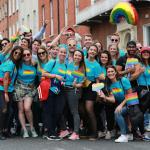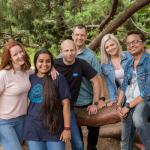Ramadan is a highly respected and blessed month for Muslims all across the globe. It is one of the five pillars of Islam which Muslims regard very highly.
At Salesforce our employees span every corner of the world, and come from different faiths and religious backgrounds. Not knowing a lot about the typical day-to-day of someone practicing Ramadan, I wanted to catch up with some Salesforce employees in the UK to gain a better understanding of what Ramandan is really like.
Zahid Jiwa (Senior AVP)
Personal Betterment & Enlightenment
Ramadan is probably one of my favourite times of the year for two reasons. While I don’t fast (because I suffer from migraines that don’t allow me to function), I do use it to try and make small changes in my life or investments in areas where I’ve failed over the last 11 months to try and be better.
Last year, it was to make sure I stopped working at a certain hour to support my family who were going through IVF at the time. So that was one of the changes that I made during Ramadan and it was forced by making sure that we prepared to eat together as a family.
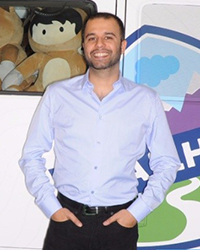
This year, it’s to cut down on screen time and social media, so I’ve made a commitment to myself that I won’t have any social media or be on my phone after fast breaks. I also hope to continue this next year. I use Ramadan to make the changes I’ve been intending to do, but never prioritised, as a way of finding betterment or enlightenment during the month. I also ensure to put family first. You can get very busy with work and social, and so I try to prioritise events around family and Iftar (breaking fast) where we get together more frequently than we normally do. And I’m glad we do that, because last year was my last Ramadan with my grandfather – he died in October – and I remember how much time we got with him telling stories, laughing, and eating around the time of Iftar.
Zubair Salim (Account Executive)
Community
Being part of a vibrant, multi-faith community and playing an active and positively contributing role in the development of that community is a central tenant to all Monotheistic religions – Islam is no exception.
As Muslims – and especially during Ramadan, we are encouraged to pray in congregation, perform the Taraweeh as a mass collective, and give alms to the less fortunate – all discrete acts which build toward a larger sense of community purpose, which go beyond the individual, to contribute to the common good.
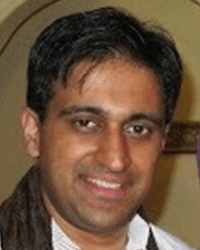
But for this Ramadan, the opportunity to reconnect with my community in a post-pandemic world represents something more profound. It represents a chance to re-connect with old school mates, receive (unwanted) advice from my father’s best friends, gather funds for my friends’ families in the Ukraine, and crush the loneliness felt by my elderly neighbours. I will also get the chance to see my son wearing a Thawb (an ankle-length robe) as he attends Eid-ul Fitr prayers for the first time (the end of Ramadan).
A collection of old and new things, many of which I’m sure I took for granted in previous Ramadans…but not in 2022!
Koser Khan (Sr. Director, Customer Marketing)
Family and Charity
Fasting is one of the five pillars of the Islamic faith, but there’s a lot more to Ramadan (the 9th month in the Islamic calendar) than not eating and drinking from sunrise to sunset. It’s a time for cleansing and connecting, for gratitude and giving back; for humility and humanity – even more so than at any other time of the year.
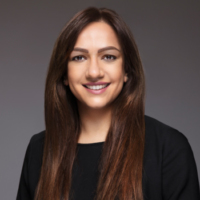
My family and I will be spending more time praying and reading the Qur’an (the Muslim holy book that was revealed during the month of Ramadan) and opening our hearts and homes to family, friends and those less fortunate – the more people at your table, the greater the blessings.
A core element of fasting – and one I’m super passionate about – is charity. It’s mentioned throughout the Quran – highlighting its significance in Islam. We’ll be playing our small part in making the world a better place; whether it’s feeding a family for a month, sponsoring a child’s year of schooling, building a water well or running a bread factory for a day. It’s a time for us all to drop the bad habits, adopt good ones and apply them to our lives throughout the year and beyond.
Ansar Ahmed (VP, Solution Engineering)
Fasting
During Ramadan, a typical day will start between 3 and 4am. We get up at that time and have a light breakfast. Personally, getting up at this time is the hardest part of Ramadan. Going without food or water is much easier to handle than the early mornings! I actually find it easier working from the London office during Ramadan, as the journey to and from work and the distractions of the office make the days go faster, and by the time I get home it’s usually time to open the fast – Iftar. Some of my colleagues are very conscious of eating or drinking in front of me. They need not worry during Ramadan though, as I’m actually more introspective and it really doesn’t bother me at all.
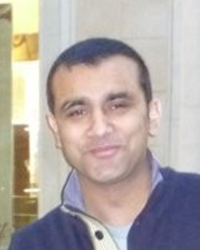
As the last the two Ramadans were during lockdown, this year the end of fasting will be a much more social occasion, with friends and family getting together to open the fast and a major celebration (Eid) which is held at the end of Ramadan. This is definitely something that will be extra special this year.
The other thing to note is that I’ve never actually lost weight during Ramadan despite no food or drink during the day. If anything it’s the reverse as I eat way too much junk food in the evenings, plus zero exercise! It’s like having 30 cheat days (or should I say cheat evenings) in a row. A lot of Dominos, and Nandos tend to be consumed!
Salim Sayed
Discipline and Compassion
Ramadan is an amazing and unique month that impacts me on so many levels. Think of it as a month of self wellbeing, reflection, and mindfulness. There is a misconception that people fast just to remember the poor. Although that does play a part, the main essence is to create self-discipline. It is an opportunity for us to curb our ego and passions so we can develop qualities within us that make us better people.
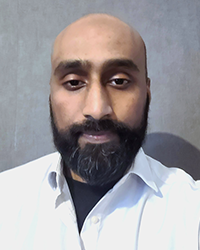
Islam always looks at the good of the greater community. It teaches one to be humble, despite your status and encourages selfless actions. This is all heightened during Ramadan. Collectively it becomes easier to do good. The Muslim philosopher Rumi says it best; ‘When you fast, good habits gather like friends who want to help.’
Ultimately, fasting helps me to become self-aware of my shortcomings. It instills good values whilst encouraging mindfulness and compassion for others.
Ruqaiyah Jaffery (Director, Corporate Marketing)
Mindfulness and Gratitude
One of the biggest shifts I’ve seen post-pandemic has been people asking themselves ‘what’s really important?’
For so many of us, being isolated meant we were able to cut out the noise and breathe, take stock and connect with ourselves. When you fast, it’s the same. The absence of food and drink heightens your other senses – making you more connected than ever before, in what you say, think and do. And breathe – I mean, really breathe – and focus on the bigger picture. And truly, like most people, it makes me realise how much I have to be thankful for.
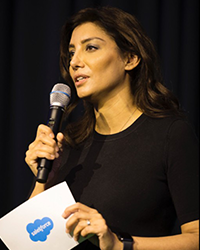
Being thankful doesn’t just mean appreciating what we have, but to actively say ‘Thank you’ to people. Also, expressing thanks in your actions whether that’s giving someone a compliment, letting your teenage sons have the last of the chocolate biscuits (you’ve no idea how much you can crave chocolate when you’re fasting!) and generally adopting a positive mindset and appreciating what you have – be it parents, family, children, friends, water, shelter, health, food, (…chocolate..the list goes on). Ramadan is a month of so many things – love, devotion, forgiveness, patience, gratefulness, and I’ll be starting every day, with ‘I’m thankful for….’
Reflection
As someone who knew embarrassingly little about Ramadan, it surprised me to realise how much more is involved than just fasting, and what the fasting really symbolises. There are a lot of lessons that can be drawn from what my colleagues have covered here. Ramadan seems to me to be a time to take a step back, self-reflect, be thankful, and focus on self-betterment – and regardless of religion, I think these habits are beneficial to us all.
Ramadan Mubarak! To learn more about Salesforce’s commitment to equality, check out our website, and for open job vacancies, have a look at our Careers Site.


















